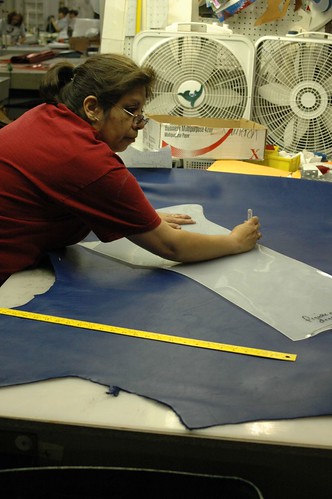
Monday in the 3rd Week of Easter
Memorial of St. John Baptist de la Salle, Priest
Paschal Pattern and Person
Readings: Acts 6:8-15; Psalm 119:23-24, 26-27, 29-30; John 6:22-29
Picture: CC USRodeoSupply
Coincidentally, on a day when we celebrate the memory of the great educationist St. John Baptist de la Salle, our readings present us with what may be seen as a teacher’s problem. Consider first the situation of the psalmist. Faced with persecution, he asks the Lord to teach him to recognize and to remain faithful to the demands of God’s law. He asks to be taught to distinguish between two paths. Make me understand the way of your precepts, he begs. Remove from me the way of falsehood and favor me with your law. The way of truth I have chosen; I have set your ordinances before me. Learning to distinguish the way of truth from the way of falsehood, isn’t the concern of every Christian? How then does God go about answering such a prayer? How does God teach us to walk the way of truth?
Given the reference to the law, it is perhaps tempting to think immediately of a code, of a list of prescriptions or guidelines that seek to cover as many situations as it’s possible to conceive. It’s perhaps tempting to fall back on a model of education that emphasizes pure rote learning and regurgitation, whether of a set of prayers or scripture verses. Although there surely is a place for such forms of learning – we do at least need to know how to say our prayers, for example – God’s approach seems to have a different emphasis. Instead of focusing on the law as expressed in a code, God fulfills the law by embodying it in a person. As Jesus says in the gospel: Do not work for the food that perishes but for the food that endures for eternal life… This is the work of God, that you believe in the one he sent. To walk the way of truth has less to do with studying a code than with getting to know and to love a person.
This, however, doesn’t quite take us out of the woods, for Jesus no longer walks the earth the way he did before his passion, death and resurrection. We can’t see and hear, touch and interact with him the way the people in the gospel could. How then are we to get to know and love him? Especially for Catholics, a ready answer should probably spring easily to mind. As source and summit of our faith, the Eucharist is the privileged place where, as a people assembled by God, we encounter and interact with our crucified and risen Lord. But caution is still necessary, isn’t it? For isn’t it possible to come to the Eucharist with dispositions similar to those of the people in the gospel, who sought Jesus only because he could solve their problems? Or what about Stephen’s opponents in the first reading? Isn’t it possible to approach the Eucharist with a kind of obsession over trivial minutiae, which parallels their clinging to the customs that Moses handed down? We are, of course, far from advocating that anything goes. Even so, something else seems to be primary. We find a distinguishing mark of the Eucharist in the gospel reading for Holy Thursday, at the Mass of the Lord’s Supper. After washing his disciples’ feet, Jesus tells them: I have given you a model to follow… Or, in another translation, I have given you an example so that you may copy… (John 13:15) Isn’t this model of the suffering servant the key distinguishing mark of the way of truth? Isn’t this also the paschal pattern that we see reproduced in the experience of Stephen in the first reading? And isn’t this the true challenge of Christian faith-formation? Like a tailor working with a dress stencil, or a blogger constructing a website with a blogskin or template, aren’t we called to learn to walk the way of truth by reproducing in our own lives the pattern and person of the One who suffered, died and was raised to life for us?
How are we being taught to do the same today?
Good evening Fr. Chris. You have such a way of teasing out a response from your reader by your perceptive weaving of the biblical text, challenging us.
ReplyDeleteOften times we get caught up with the form and forget the substance and in this case, it is the very living bread that we take at mass; reminding us of the dignity of our personhood.
How do we remain in the world and yet be out of it? It's like living in the present with an eye to eternity, clearly differentiating the essence from the fluff. Is it possible to be in a constant state of heightened awareness of God's presence in our every action.
To be sure, I must confess that there are more lapses than I care to recount. However each time I falter, I know that His grace is proffered without condition.
I was schooled (both primary and secondary) by the La Salle brothers, and it was in those early years that my faith formation first took root.
ReplyDeleteI can identify with the prayer of the psalmist because certainty is important to me. I want to know that what I do is pleasing to God. And yet the only certainty that confronts me is my own broken-ness.
As a teacher, my work is governed by codes of practice, manuals, guidelines, statutes, etc. To be honest, they are overwhelming and do not always produce the results they were intended to bring about in the first place. At the Eucharist, the Way exemplifies Christian servanthood and the Truth subsumes our brokenness in the Bread broken, as a code of practice for all to follow.
St John Baptist de la Salle, pray for us.